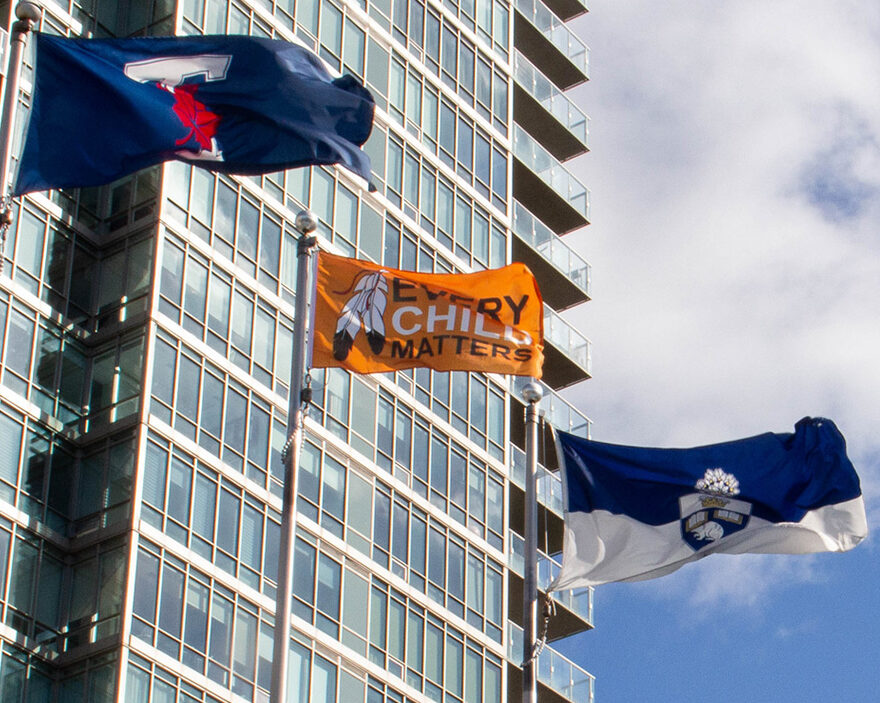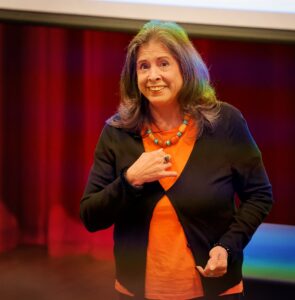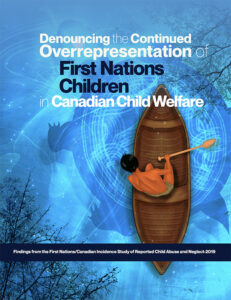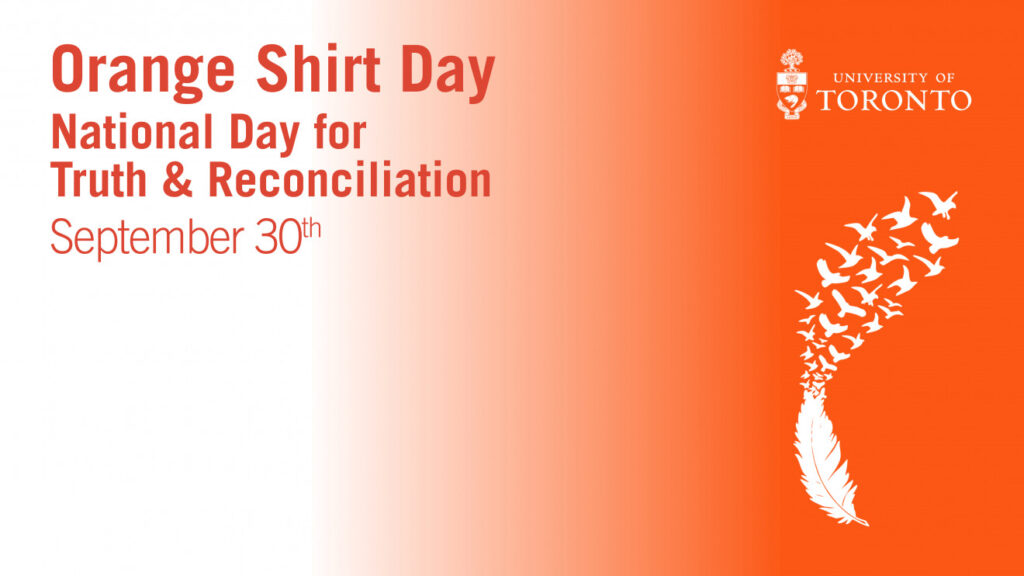Orange Shirt Day & National Day for Truth and Reconciliation

September 30 marks Orange Shirt Day and the National Day for Truth and Reconciliation — a day to honour Survivors of residential schools and those who never returned home, as well as the families and communities who continue to be affected by intergenerational trauma.
In recognition of this day, the Factor-Inwentash Faculty of Social Work invites students, alumni, faculty and staff to join a University-wide event at Hart House on September 30. With help from members of our community, we have also compiled a list of other events, workshops and resources — including reading lists, videos, reports and publications by FIFSW faculty members — to enhance knowledge and understanding leading up to the National Day of Truth and Reconciliation and beyond.
Photo, above: The Every Child Matters Flag flies at Varsity Stadium in advance of Orange Shirt Day and the National Day for Truth and Reconciliation on Sept. 30, which will be marked by events across the university (photo by Makeda Marc-Ali). > Click here for the full story in U of T News.
Orange Shirt Day 2022: Hart House
September 30
9:30am – 11:00am
On September 30, the University of Toronto will commemorate Orange Shirt Day with remarks from Kelly Hannah-Moffat, Vice-President, People Strategy, Equity & Culture, and Alexandra Gillespie, Vice-President & Principal, University of Toronto Mississauga, in The Great Hall at Hart House. Brenda Wastasecoot, Assistant Professor at the Centre for Indigenous Studies, will provide the keynote address: “The Nikis Story is the Story of Canada: Reflecting on the Impacts of the Indian Residential Schools.”
Students, librarians, faculty, alumni and staff may register to attend this event in-person or watch the livestream.
> Learn more and register here to attend in person
The event will also be livestreamed on YouTube (Link opens in a new tab) via this link.
Other Upcoming Events
Indigenous U of T
Various events & workshops
> View upcoming events
U of T’s Indigenous U of T website provides an overview of initiatives, services and academic programs specific to the Indigenous community on all three U of T campuses. Upcoming events include staff & faculty training sessions, and a U of T Indigenous Community Gathering on October 3 at Hart House Farm.
Jody Wilson-Raybould on True Reconciliation: How to Be a Force for Change – In Person Event
Presented by U of T’s Rotman School of Management
Monday, November 7
5:00 – 6:00pm EDT
Tickets: $37.00 plus HST (includes copy of the book)
>Register here
Canada’s pathway towards reconciliation and healing has made progress, yet there is still a long way to go. How can individuals, communities, organizations, and the government take concrete and tangible action to advance true reconciliation across Canada? Jody Wilson-Raybould, Canada’s first Indigenous Justice Minister and Attorney General and best-selling author, has a solution. Join in person for a timely conversation as she discusses her new book, True Reconciliation: How to Be a Force for Change with The Globe and Mail’s Robyn Doolittle.
Reading lists & publications
 A reading list from Cynthia Wesley-Esquimaux, Chair on Truth and Reconciliation in Canada for Lakehead University
A reading list from Cynthia Wesley-Esquimaux, Chair on Truth and Reconciliation in Canada for Lakehead University
Dr. Cynthia Wesley-Esquimaux, Chair on Truth and Reconciliation in Canada for Lakehead University, presented the talk “Deconstructing the Reconciliation Conversation” at FIFSW’s Introduction to Social Work Conference on September 8th. At the close of her talk to new students, Wesley-Esquimaux promised to provide a reading list for all those interested in gaining a deeper understanding of the issues associated with Truth and Reconciliation. > Click here to view Dr. Cynthia Wesley-Esquimaux’s list
U of T Book Store Reading List
The U of T Bookstore has compiled a list of suggested non-fiction and historical fiction books to read in honour of the National Day of Truth and Reconciliation. > Click here to view U of T Bookstore’s list
U of T Mississauga
UTM has shared a great list of Orange Shirt Day Resources on its website. > Click here to view the UTM list
U of T News
U of T News stories related to Truth and Reconciliation can be found on its website. > Click here to view them all
U of T Annual Progress Report on Indigenous Initiatives
> Click here to read the 2021 report
FIFSW research, reports and publications
 Denouncing the Continued Overrepresentation of First Nations Children in Canadian Child Welfare
Denouncing the Continued Overrepresentation of First Nations Children in Canadian Child Welfare
Co-authored by FIFSW faculty members Barbara Fallon, Kenn Richard, Tara Black, Bryn King and others, Denouncing the Continued Overrepresentation of First Nations Children in Canadian Child Welfare is a collaborative effort by the First Nations Advisory Committee and researchers involved in the The First Nations/Canadian Incidence Study of Reported Child Abuse and Neglect. The aim of the publication is to:
1. Continue to monitor national-level data on investigations involving First Nations children compared to non-Indigenous children as intended by the Truth & Reconciliation’s Calls to Action
2. Ensure the appropriate contextualization of findings.
3. Disseminate research results to First Nations communities.
The First Nations/Canadian Incidence Study of Reported Child Abuse and Neglect is a national study of child welfare investigations involving First Nations and non-Indigenous children.
> Click here to read the report
Journal of Indigenous HIV Research 2Shawls Article Collection
2SHAWLS (the Two-spirit HIV/AIDS Wellness and Longevity Study) was a project co-led by FIFSW Professor David Brennan, Indigenous elder and community provider Art Zoccole, noted Indigenous social work scholar Randy Jackson, as well as another Indigenous leader, the late Tony Nobis.
“The research team was a blend of HIV-positive two-spirit/gay/bisexual men who are living long-term with HIV and settler academics,” wrote the researchers. “This created opportunities and challenges to be able to teach each other about what our world views are, how we come to understand the world, and how we can seek to create change to better represent the needs of two-spirit men living long-term with HIV.”
> Click here to read the collection
A selection of recent peer reviewed publications by FIFSW faculty
Quinn, A.L. (2022). Bridging Indigenous and Western Methods in Social Science Research. International Journal of Qualitative Methods, 21. DOI: 10.1177/16094069221080301
Quinn, A. L.(2022). Experiences and well-being among Indigenous former youth in care within Canada. Child Abuse & Neglect. DOI: 10.1016/j.chiabu.2021.105395
Quinn, A.; Fallon, B.; Joh-Carnella, N.; & Saint-Girons, M. (2022). The overrepresentation of First Nations children in the Ontario child welfare system: A call for systemic change. Children and Youth Services Review, 139. DOI: 10.1016/j.childyouth.2022.106558
Johnstone, M. & Lee, E. (2021). Epistemic Injustice and Indigenous Women: Toward Centering Indigeneity in Social Work. Affilia-Journal of Women and Social Work. DOI: 10.1177/0886109920985265.
Lee, E. & Johnstone, M. (2021). Historical trauma and healing: Critical Discourse Analysis of public apologies in Canada. Critical Sociology, online first. DOI: 10.1177/08969205211052326
Mishna, F.; Middelton-Moz, J.; Martell, R.; Williams, C.; & Zuberi, S. (2021). Indigenous trauma and resilience: pathways to ‘bridging the river in social work education. Social Work Education. DOI: 10.1080/02615479.2021.1998427
Videos
Decolonizing Pathways Towards Integrative Healing in Social Work
In April 2021, the Factor-Inwentash Faculty of Social Work presented a two-hour workshop on Decolonizing Pathways Towards Integrative Healing in Social Work, inspired by Michael Yellow Bird and Kris Clarke’s book of the same name. Featuring a dialogue with the authors and a panel discussion with grassroots community leaders, this workshop created a space for social workers and those interested in the field to strengthen their knowledge and commitment to:
- Holding social work accountable for historic and ongoing complicity in colonial practices
- Learning from social movements and Indigenous resistance to colonial violence, and
- Creating pathways for knowledge that was closed by colonial systems to transform and decolonize social work theory and practice.
